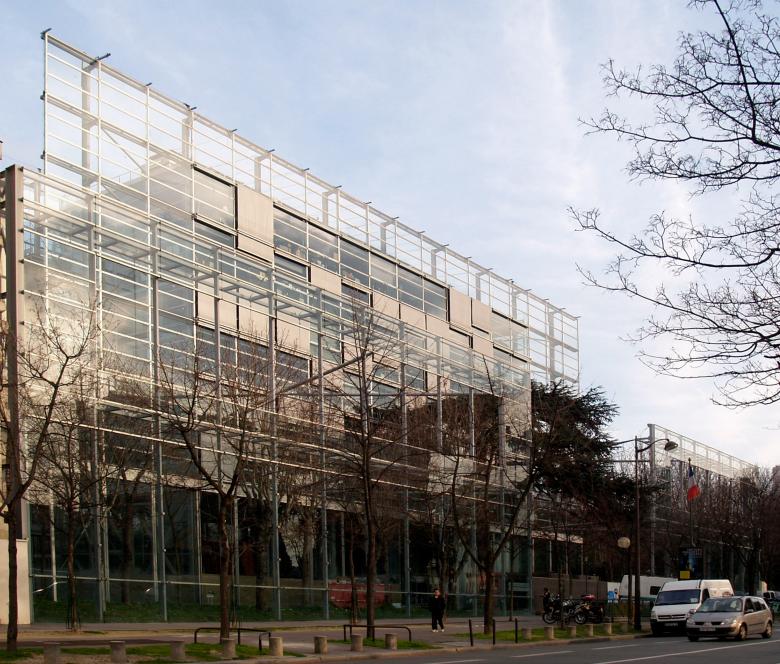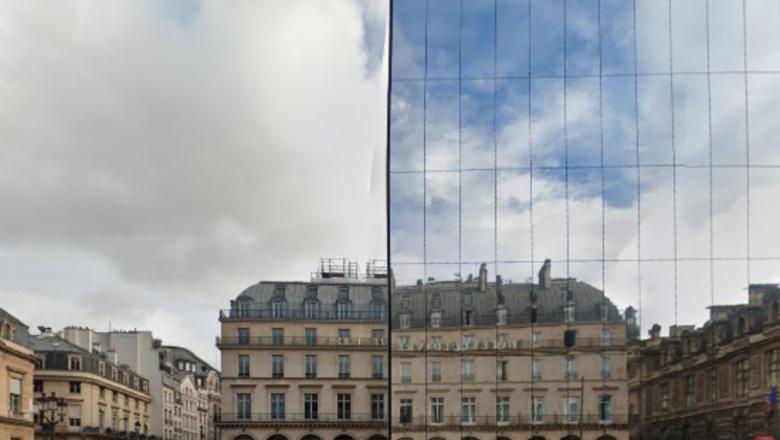And Move Into Haussmannian Building Near the Louvre
Fondation Cartier to Depart Jean Nouvel Building
The Fondation Cartier pour l'art contemporain has announced that, in celebration of its 40th anniversary this year, it will be moving into a historic building on Place du Palais-Royal by the end of 2025. Interior renovations will be carried out by Jean Nouvel, the architect of its current building.
Ten years after the Fondation Cartier pour l'art contemporain was founded, the institution moved from its home near Versailles to a transparent, glassy building on Boulevard Raspail in Paris. Designed by Jean Nouvel, the building opened to the public in 1994, seven years after the French architect completed the similarly lauded Institut du monde arabe overlooking the Seine.
Inauguration of the Fondation Cartier in Jean Nouvel's building at 261 Boulevard Raspail in 1994
Punctuated by François Mitterrand's Grands Projets, the late 1980s and early 1990s were an exciting time for contemporary architecture in Paris, with buildings designed by famous architects from France and abroad opening annually. The year 1994 also saw the opening of the Frank Gehry-designed American Center, the institution that formerly occupied the plot at 261 Boulevard Raspail, having sold it to the Fondation Cartier in 1986. While the old American Center building was demolished, the old trees around it, including the famous Chateaubriand Cedar, were kept, fleshed out by the planting of additional trees. With its layers of ultra-clear glass walls, building and landscape effectively combined to turn the museum into, in Nouvel's words, “a phantom in the park.”
With such a remarkable building, today's news from Fondation Cartier is bittersweet, even though the institution is retaining Nouvel for the interior transformation of its new home that is currently under construction. For certain, the Fondation Cartier — explicitly a separate entity from the commercial Maison Cartier, per today's announcement — will be gaining more exhibition space, from approximately 1,200 m2 (13,000 sf) at Raspail to 6,500 m2 (70,000 sf) at Palais-Royal. Behind the large bay windows that face onto the Rue du Faubourg Saint-Honoré, Rue de Rivoli and Place du Palais-Royal, the existing Haussmannian building from 1855 will be opened up, including “the creation of layered vertical spaces which can reach up to 11 meters [36 feet] high.” The announcement further describes the creation of “five mobile platforms covering 1,200 square meters which can modify the surface area and the navigation of the building,” and which will be surrounded by walkways of a similar floor area. Artnet has a rendering of the interior and a photograph showing its construction progress.
“Moving into such an impressive site, in terms of location and history, entails a form of invention. And what is invented is not automatically seen in the steel or stone. The space is marked by a different way of doing: a way of conceiving how artists can have maximum power of expression. A site such as this one calls for boldness, courage that artists might not necessarily demonstrate in other institutional spaces. The Fondation Cartier will likely be the institution offering the greatest differentiation of its spaces, the most diverse exhibition forms and viewpoints. Here, it is possible to do what cannot be done elsewhere, by shifting the system of the act of showing.”
While today's announcement from the Fondation Cartier says it will leave Boulevard Raspail “at the end of 2025 and start the third chapter of its history with the opening of new spaces on Place du Palais-Royal in Paris,” it does not offer any indication what will happen to the modern masterpiece designed by Jean Nouvel thirty years ago.


